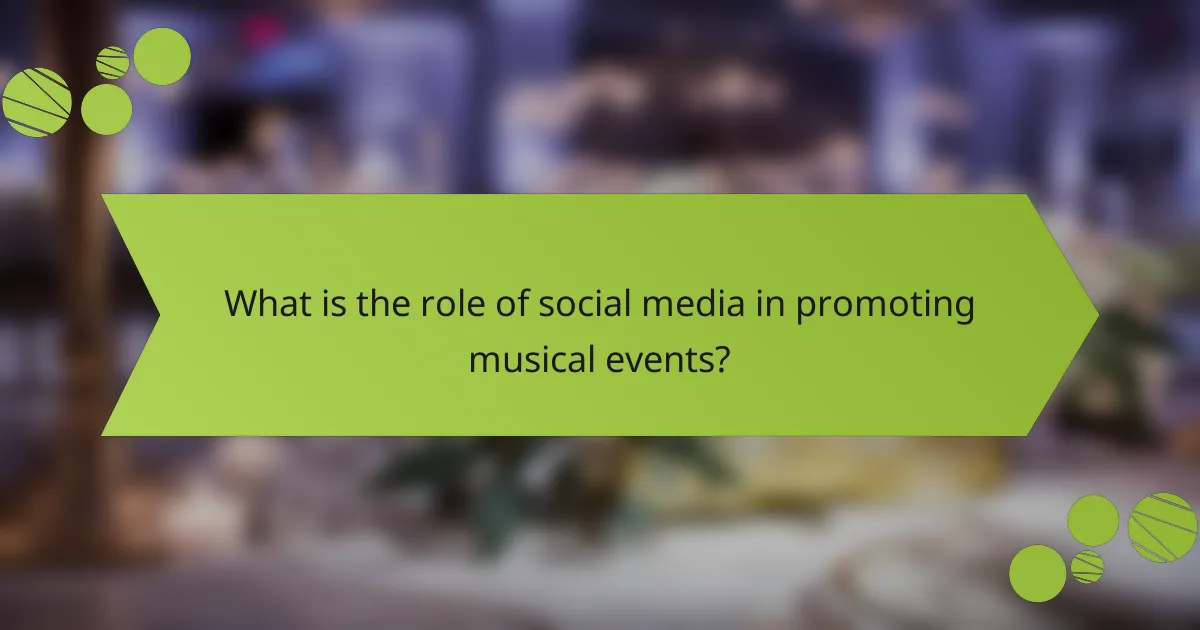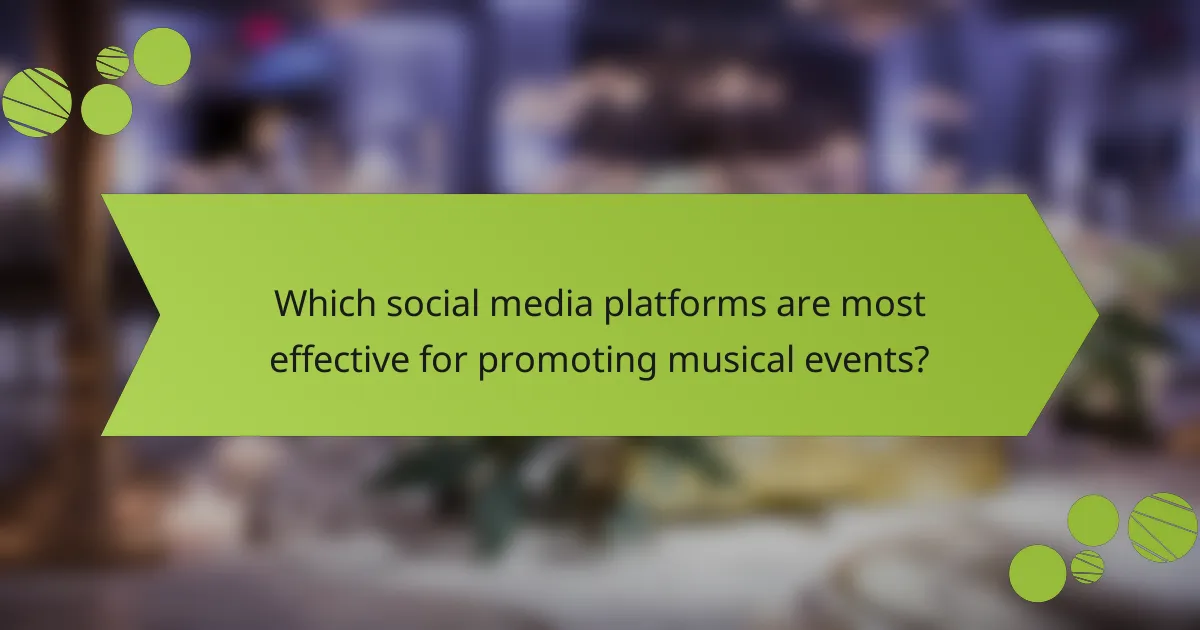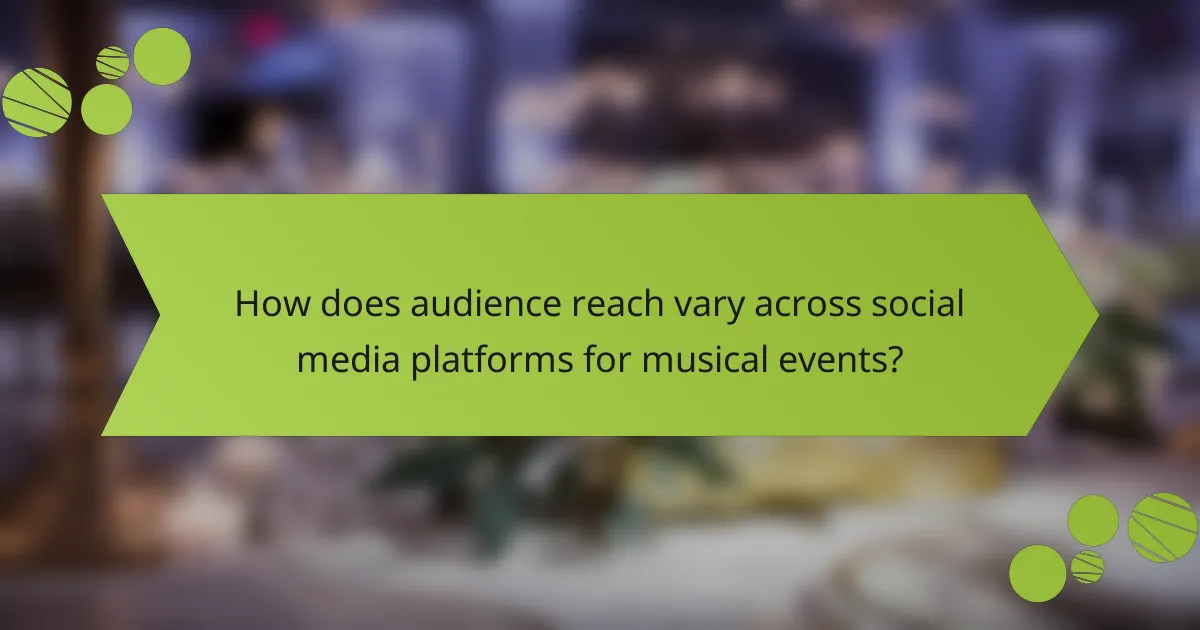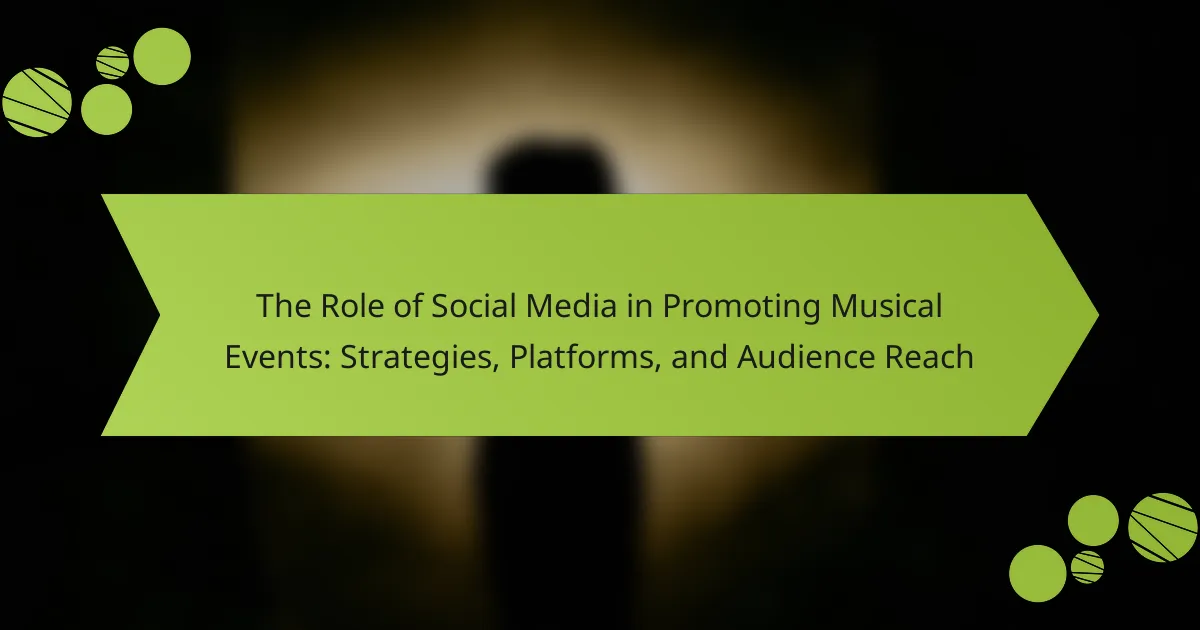Social media is a vital tool for promoting musical events, allowing artists and organizers to quickly reach extensive audiences. Key platforms such as Facebook, Instagram, and Twitter facilitate event announcements, targeted advertising, and real-time engagement, enhancing visibility and driving ticket sales. Statistics indicate that 62% of event attendees discover events through social media, highlighting its effectiveness. Each platform offers unique advantages: Facebook provides broad reach, Instagram engages visually, and Twitter supports real-time interaction. Additionally, emerging platforms like TikTok and established ones like YouTube play significant roles in music promotion, influencing audience engagement and event discovery.

What is the role of social media in promoting musical events?
Social media plays a crucial role in promoting musical events. It enables artists and organizers to reach a vast audience quickly. Platforms like Facebook, Instagram, and Twitter facilitate event announcements and updates. They allow for targeted advertising to specific demographics. Engagement through posts, stories, and live videos increases visibility. User-generated content amplifies reach as attendees share their experiences. Social media can drive ticket sales through direct links and promotions. Statistics show that 62% of event attendees discover events through social media. This underscores its effectiveness in event promotion.
How has social media changed the landscape of musical event promotion?
Social media has transformed musical event promotion by enhancing audience engagement and broadening reach. Platforms like Facebook, Instagram, and Twitter allow artists and promoters to connect directly with fans. This direct communication fosters community and loyalty among audiences. Additionally, social media enables real-time updates about events, increasing excitement and attendance. According to a 2020 survey by Eventbrite, 79% of event creators use social media for promotion. This statistic highlights the reliance on these platforms for effective marketing. Social media also facilitates targeted advertising, allowing promoters to reach specific demographics. As a result, event visibility and ticket sales have significantly increased. Overall, social media has redefined how musical events are marketed and experienced.
What are the key features of social media that benefit musical event promotion?
Key features of social media that benefit musical event promotion include wide audience reach, targeted advertising, and real-time engagement. Social media platforms have billions of active users, allowing artists to reach diverse demographics. Targeted advertising enables promoters to focus on specific audience segments based on interests and behaviors. Real-time engagement fosters interaction between artists and fans, enhancing community building. User-generated content, such as shares and reviews, amplifies event visibility. Analytics tools provide insights into audience behavior and preferences, guiding promotional strategies. Live streaming features allow for virtual attendance, expanding reach beyond physical venues. These features collectively enhance the effectiveness of musical event promotion.
How do different demographics engage with musical events on social media?
Different demographics engage with musical events on social media in varied ways. Younger audiences, particularly millennials and Gen Z, predominantly use platforms like Instagram and TikTok. They share experiences through posts, stories, and live streams. Older demographics, such as Gen X and baby boomers, often prefer Facebook for event information and community interaction.
Research indicates that 68% of Gen Z use social media to discover new music. In contrast, 54% of older adults rely on social media for event updates. Engagement levels also differ; younger users tend to post more frequently about events, while older users may focus on sharing and commenting.
Overall, social media serves as a crucial tool for connecting different age groups to musical events, tailoring content to their preferences.
What strategies can be employed for effective promotion of musical events on social media?
Utilizing targeted advertising is a key strategy for promoting musical events on social media. Platforms like Facebook and Instagram allow event organizers to reach specific demographics. Creating engaging content, such as videos and behind-the-scenes footage, can capture audience attention. Collaborating with influencers can extend the event’s reach to their followers. Consistent posting and updates keep the audience informed and engaged. Utilizing event pages and countdowns creates anticipation among potential attendees. Engaging with followers through comments and messages fosters community and connection. Analyzing engagement metrics helps refine future promotional strategies.
How can content creation enhance the visibility of musical events?
Content creation enhances the visibility of musical events by generating engaging and shareable material. High-quality videos, images, and posts attract attention on social media platforms. These platforms, like Instagram and Facebook, have millions of active users. Engaging content encourages audience interaction, increasing organic reach. For instance, events with promotional videos see 49% more engagement. Consistent content updates keep the event top-of-mind for potential attendees. User-generated content, such as audience photos, further amplifies visibility. Overall, effective content creation builds anticipation and drives ticket sales.
What role do influencers play in promoting musical events on social media?
Influencers play a crucial role in promoting musical events on social media. They leverage their large followings to reach a wider audience. Influencers create engaging content that showcases the event. This content often includes videos, stories, and posts that generate excitement. Their endorsements can significantly boost ticket sales. According to a study by Influencer Marketing Hub, 63% of consumers trust influencers’ recommendations. This trust leads to higher engagement rates and attendance. Additionally, influencers often collaborate with event organizers for exclusive promotions. This partnership enhances visibility and credibility for the event.
How can targeted advertising improve audience engagement for musical events?
Targeted advertising can significantly improve audience engagement for musical events by reaching specific demographics. This approach allows event organizers to tailor their marketing messages to the interests and preferences of potential attendees. For instance, targeted ads can focus on users who have previously shown interest in similar music genres or artists.
Research indicates that personalized marketing increases engagement rates by up to 50%. By utilizing data analytics, advertisers can identify and segment audiences based on age, location, and music preferences. This ensures that promotional content resonates with the intended audience.
Moreover, targeted advertising can enhance ticket sales and event participation. According to a study by the Event Marketing Institute, 83% of marketers reported that targeted advertising improved their event attendance. This strategy not only boosts engagement but also fosters a sense of community among attendees who share similar musical tastes.

Which social media platforms are most effective for promoting musical events?
Facebook, Instagram, and Twitter are the most effective social media platforms for promoting musical events. Facebook allows event creation and targeted advertising. Instagram’s visual content engages users effectively. Twitter facilitates real-time updates and interaction with fans. According to a 2021 survey by Eventbrite, 77% of event organizers use Facebook for promotion. Instagram follows closely, with 43% of organizers leveraging its platform. These platforms provide tools that enhance visibility and audience engagement for musical events.
What unique features do different social media platforms offer for event promotion?
Facebook offers event pages that allow users to RSVP and share events with friends. This feature helps increase visibility and engagement. Instagram provides visually appealing stories and posts, enabling event promotion through eye-catching images and videos. Twitter allows real-time updates and engagement through hashtags, reaching a wider audience quickly. LinkedIn targets professional events with features like event listings and networking opportunities. TikTok utilizes short videos to create viral content, promoting events in a fun and engaging way. Each platform’s unique features cater to different audiences and promotion styles, enhancing overall event visibility.
How can Facebook be leveraged for promoting musical events?
Facebook can be leveraged for promoting musical events by utilizing its targeted advertising features. Event organizers can create dedicated event pages to share details and updates. Facebook’s event tools allow for RSVP tracking and guest interaction. Sharing multimedia content, such as videos and images, can enhance visibility. Engaging with followers through posts and comments fosters community. Collaborating with local influencers can broaden reach. Facebook Insights provides analytics to assess engagement and optimize strategies. These methods collectively enhance audience reach and event attendance.
What advantages does Instagram provide for showcasing musical events?
Instagram offers several advantages for showcasing musical events. Firstly, it provides a visual platform that enhances engagement through images and videos. This is crucial for capturing the excitement of live performances. Secondly, Instagram Stories allow for real-time updates, keeping followers informed about event details. These updates can include behind-the-scenes content, which adds a personal touch. Thirdly, the platform’s extensive reach enables artists to connect with a global audience. According to Statista, Instagram had over 1 billion active users as of 2023, providing a vast potential audience for musical events. Additionally, Instagram’s hashtag feature helps in categorizing content, making it easier for users to discover events. This increases visibility and can lead to higher attendance. Lastly, the platform’s interactive features, such as polls and questions, encourage audience participation, fostering a sense of community around musical events.
How can Twitter be used to create buzz around musical events?
Twitter can be used to create buzz around musical events by leveraging its real-time engagement features. Artists and promoters can share event announcements, teasers, and behind-the-scenes content. Hashtags can be utilized to unify conversations and increase visibility. Engaging with fans through polls and Q&A sessions fosters a sense of community. Live-tweeting during events keeps the audience engaged and encourages sharing. Collaborating with influencers amplifies reach and credibility. Statistics show that tweets with images receive 150% more retweets, enhancing visibility. Additionally, countdowns and reminders can build anticipation leading up to the event.
What are the emerging platforms that could impact musical event promotion?
Emerging platforms that could impact musical event promotion include TikTok, Clubhouse, and Discord. TikTok allows artists to share short videos, creating viral trends that can boost event visibility. Clubhouse offers audio-based networking, enabling artists to engage directly with fans in real-time discussions. Discord provides a community space for fans to interact, share information, and promote events collaboratively. These platforms facilitate direct engagement and foster community, enhancing the promotional strategies for musical events.
How does TikTok influence the promotion of musical events?
TikTok significantly influences the promotion of musical events through viral trends and user-generated content. The platform allows artists to share short clips of their music, creating catchy challenges that engage users. This engagement often leads to increased visibility for upcoming events. In 2021, a study by the University of Southern California found that songs trending on TikTok saw a 300% increase in streams. Additionally, artists can directly interact with fans, fostering a sense of community. TikTok’s algorithm promotes content based on user interests, ensuring that relevant musical events reach targeted audiences effectively.
What potential does Clubhouse hold for live musical event promotion?
Clubhouse holds significant potential for live musical event promotion. The platform enables real-time audio interaction, allowing artists to engage directly with their audience. This creates a unique environment for live performances and discussions. Clubhouse’s format encourages intimate, personal experiences, enhancing fan connection. Additionally, it allows for collaborations between artists and influencers, expanding reach. The ability to host exclusive events can drive interest and attendance. Statistics show that audio content consumption has increased, indicating a growing audience for such platforms. Overall, Clubhouse can effectively amplify promotional efforts for live musical events.

How does audience reach vary across social media platforms for musical events?
Audience reach for musical events varies significantly across social media platforms. Facebook typically offers the largest audience reach due to its vast user base, with over 2.9 billion monthly active users. Instagram follows closely, appealing to younger demographics with high engagement rates. Twitter provides real-time updates but has a smaller audience, making it less effective for broad reach. TikTok has rapidly gained traction, especially among Gen Z, for viral music promotion. YouTube remains a powerful platform for music videos and live streams, attracting millions of viewers. LinkedIn, while not traditionally used for musical events, can reach niche audiences in the music industry. Each platform’s unique user demographics and engagement styles influence how effectively they promote musical events.
What factors influence audience reach on different social media platforms?
Audience reach on different social media platforms is influenced by several key factors. These factors include platform algorithms, user demographics, content type, posting frequency, engagement rates, and advertising options.
Platform algorithms determine how content is distributed to users. For example, Facebook and Instagram prioritize content based on user interactions. User demographics affect which platforms are most effective. Younger audiences may prefer TikTok, while older users may favor Facebook.
Content type matters as well. Visual content often performs better on Instagram, while informative posts may thrive on LinkedIn. Posting frequency can impact visibility; consistent posting keeps the audience engaged. Engagement rates, such as likes and shares, signal to the algorithm that content is valuable.
Finally, advertising options allow for targeted reach. Platforms like Facebook offer advanced targeting capabilities to reach specific demographics. These factors collectively shape the audience reach across various social media platforms.
How does engagement rate affect audience reach for musical events?
Engagement rate directly influences audience reach for musical events. Higher engagement rates indicate that audiences are actively interacting with content. This interaction can lead to increased visibility on social media platforms. Algorithms often promote content with higher engagement to a wider audience. For example, posts with high likes, shares, and comments tend to appear more prominently in feeds. Additionally, engaged audiences are more likely to share event information with their networks. This sharing can exponentially expand the reach beyond the initial audience. Studies show that events with strong social media engagement can see attendance increases of 20% or more. Thus, fostering engagement is crucial for maximizing audience reach in musical events.
What metrics should be analyzed to measure audience reach effectively?
Key metrics to analyze for measuring audience reach include impressions, reach, engagement rate, and follower growth. Impressions indicate how many times content is displayed, regardless of clicks. Reach measures the total number of unique users who see the content. Engagement rate reflects audience interaction, calculated by dividing total engagements by reach. Follower growth tracks the increase in followers over time, indicating expanding audience potential. Each metric provides insight into the effectiveness of social media strategies for promoting musical events. For example, high impressions with low engagement may suggest content needs improvement.
What best practices can enhance audience reach for musical events on social media?
Utilizing targeted advertising enhances audience reach for musical events on social media. Platforms like Facebook and Instagram allow precise demographic targeting. This ensures promotional content reaches individuals interested in similar music genres. Engaging content, such as videos and behind-the-scenes footage, captures audience attention. Regular updates keep followers informed and excited about the event. Collaborating with influencers expands reach to their established audiences. Utilizing event-specific hashtags increases visibility across social media platforms. Lastly, analyzing engagement metrics helps refine strategies for future promotions.
How can timing and frequency of posts impact audience engagement?
Timing and frequency of posts significantly impact audience engagement. Posts made during peak user activity hours generally receive higher engagement rates. Research shows that posts published on weekdays between 10 AM and 2 PM often achieve the best interaction. Additionally, consistent posting frequency helps maintain audience interest and visibility. Brands that post regularly can enhance their reach and foster community engagement. A study by CoSchedule found that companies posting 16 times a month receive 3.5 times more traffic than those posting less frequently. Overall, strategic timing and consistent frequency are crucial for maximizing audience interaction on social media.
What types of content generate the most interaction for musical events?
Visual content generates the most interaction for musical events. This includes high-quality images, videos, and live streams. Engaging visuals capture attention and encourage sharing. User-generated content, such as fan photos and videos, also boosts interaction. Polls and interactive stories on platforms like Instagram increase audience engagement. Behind-the-scenes content offers a personal touch that fans appreciate. Event countdowns create anticipation and excitement. Data shows that posts with visuals receive 94% more views than text-only posts.
What are some common challenges in promoting musical events on social media?
Common challenges in promoting musical events on social media include audience engagement, content saturation, and platform algorithms. Engaging an audience can be difficult due to competing content. Many posts from various sources can overwhelm users. This saturation makes it hard for event promotions to stand out. Additionally, social media platforms often change their algorithms. These changes can limit organic reach, making it harder for posts to be seen. Budget constraints also affect promotional efforts. Limited funds can restrict advertising options, reducing visibility. Finally, measuring success can be complex. Analytics tools may not provide clear insights into audience behavior and engagement.
How can event organizers overcome the saturation of content on social media?
Event organizers can overcome the saturation of content on social media by focusing on unique storytelling and targeted engagement. They should create compelling narratives around their events. This approach captures audience interest more effectively than generic posts. Utilizing multimedia content, such as videos and live streams, enhances engagement. Research shows that posts with visual elements receive 94% more views.
Additionally, event organizers can collaborate with influencers to reach niche audiences. Influencers can provide authentic recommendations that resonate with their followers. Personalized communication with potential attendees can also improve engagement. Tailoring messages based on audience preferences leads to higher interaction rates.
Finally, leveraging analytics tools helps organizers understand what content performs best. Data-driven decisions can refine marketing strategies and improve visibility. By implementing these strategies, event organizers can stand out in a crowded social media landscape.
What strategies can be implemented to handle negative feedback on social media?
Respond promptly and professionally to negative feedback. Acknowledge the concern raised by the user. This shows that you value their opinion. Offer a solution or clarification to address the issue. This can help to mitigate the situation. Encourage further discussion in private messages if necessary. This keeps the conversation constructive. Monitor social media channels regularly to catch negative feedback early. Timely responses can prevent escalation. Maintain a positive tone throughout the interaction. This can help to improve the brand’s image.
What practical tips can help in effectively promoting musical events on social media?
Utilize engaging visuals and videos to capture attention on social media. High-quality images and short clips of past events can showcase the atmosphere. Create event-specific hashtags to enhance discoverability. Encourage attendees to use these hashtags when posting. Schedule posts strategically to maximize reach. Research shows that posting during peak engagement times increases visibility. Collaborate with influencers or local artists to expand your audience. Their endorsement can attract more followers. Offer exclusive content or behind-the-scenes access to generate interest. This strategy keeps followers engaged and eager for updates. Run targeted ads to reach specific demographics. Platforms like Facebook and Instagram allow precise audience targeting.
The main entity of the article is social media in the context of promoting musical events. The article provides an in-depth analysis of how social media platforms like Facebook, Instagram, and Twitter enhance audience engagement and broaden reach for musical events. It outlines effective strategies for promotion, including targeted advertising, content creation, and influencer collaborations, while also addressing the unique features of each platform that contribute to successful event marketing. Additionally, the article examines demographic engagement patterns, common challenges faced, and best practices for maximizing audience reach and interaction on social media.
